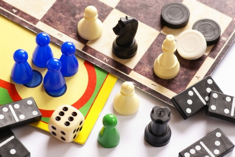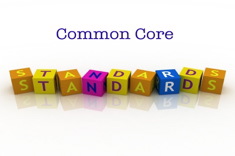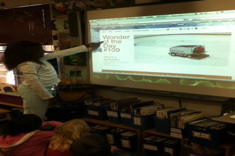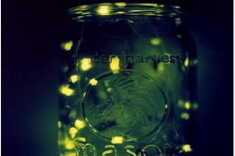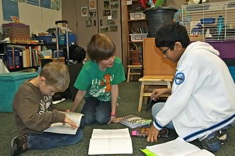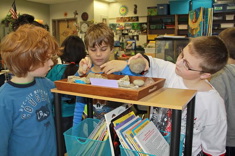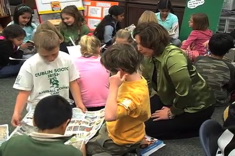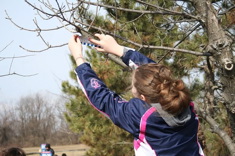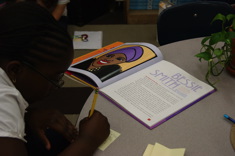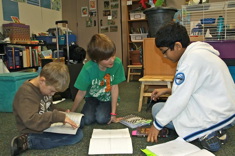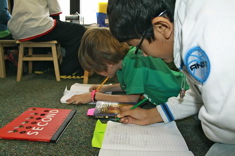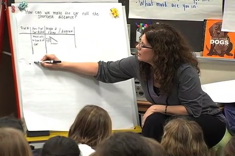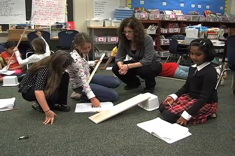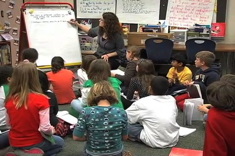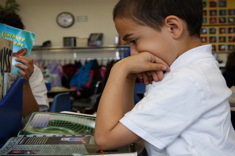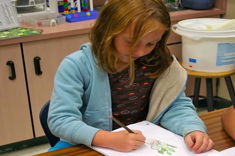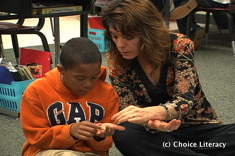Content Literacy
Reading and writing across the curriculum is sparking more interest than ever among teachers and school leaders. Here are the resources you need to build more writing into your math curriculum, more reading and talk into your science program, and especially, how to infuse more nonfiction texts into your teaching throughout the school day.
Latest Content
The Sponge Summary Lesson Part 4
In this sequence of videos, Heather Rader teaches a 4th grade class, using the analogy of a sponge to explain how summaries work. In this fourth video, Heather and students discuss their summaries in progress
Teaching and Assessing Persuasive Writing Skills
Heather Rader explores different ways into persuasive writing with teachers and students, highlighting the importance of helping students learn to cite and quote expert resources
The Power of Games for 21st Century Learners
Franki Sibberson explains how low-tech board games can be a powerful tool for developing skills that will be in high demand in the coming years.
Common Core Conversations: Reading in the Disciplines
Amanda Adrian and Heather Rader look at reading across the disciplines within the Common Core.
Current and Cocoa: Mixing Social Studies and Literacy
Current and Cocoa is a fun routine for integrating social studies, literacy, and conversation in classrooms. Heather Rader describes how the weekly activity builds community and fosters awareness of news events.
Wild Facts
Wild Facts is a terrific example of how Andrea Smith's intermediate students naturally connect web resources with content learning.
Wonderopolis: Nonfiction, Technology, and Web-Based Independent Learning
Wonderopolis hits the sweet spot so many of us are looking for in web resources for students, delivering free, engaging, high-quality nonfiction text and video in small chunks that can easily be integrated into literacy and science workshops. Andrea Smith explains how she uses Wonderopolis daily with her students.
Born Wonders: Tapping Student Interest in Animals, Babies, and Books
Cute Alert – what’s more adorable than babies or animals? Perhaps baby animals! Andrea Smith shares an addictive web resource that will instantly hook students of any age. It’s zoo postings of newborn animals from around the world, with many literacy connections.
Fireflies: Then and Now
Andrea Smith watches her young daughter capture fireflies in the twilight of a summer night. The evening reminds her of what’s changed in connecting literacy and life experiences, and what endures for teachers and kids.
How to Look at Student Work
With summaries as an example, Heather Rader uses trends from learners to help make smart instructional decisions about what is presented during whole group, small group and individual time.
Math Journals
Julie Johnson rekindles her love affair with math when she incorporates journals and sees her students become more adept at organizing and explaining their thinking.
Photovoice: Exploring Content Literacy with Images
As Suzy Kaback explores the question “How does your expertise function?” she explains the power of Photovoice and details its use in K-12 classrooms.
Content Connections in Reading Workshop
In this four-minute video, Andrea Smith confers with a 4th grade student interested in immigration, helping her set up an independent reading and learning plan.
What Velcro Can Do: Science, Literacy and Coaching Connections
No time for science? Don’t like messes? Heather Rader works with a teacher and helps her find a way to fit science neatly into her full teaching day.
Making Connections as a Reader and a Scientist
Heather Rader finds that reading is at the heart of scientists’ work.
Using Comics in Literacy Workshops
Franki Sibberson works with her 3rd and 4th graders to use comics in the literacy workshop.
Injecting Writing into Everything: Bringing the Outside In
Heather Rader helps a 3rd grade teacher break through the resistance of some student writers. The magic tool? A dirty onion from the garden.
Family History Inquiry Project: Integrating Technology with Social Studies in First Grade
Julie Johnson explains how a family history inquiry project in her first-grade classroom built technology, literacy, and research skills as students explored many cultures.
The Nuts and Bolts of the Family Inquiry Project
Julie Johnson explains how a family history inquiry project in her first-grade classroom builds technology, literacy, and research skills as students explored many cultures. This article is the second in a two-part series.
Social Justice Picture Books
If you’re looking for a read aloud to spark some discussions about making a difference in the world, you might enjoy Ruth Shagoury’s new booklist of children’s literature with a social justice theme.
Young Learners and Martin Luther King Day (BOOKLIST)
Teachers of young learners face special challenges in honoring Martin Luther King and dealing with the violent nature of his death at the same time. Mandy Robek offers some insights into how to celebrate King's life with even the youngest students.
Math, Writing, and Coaching to Learn
Heather Rader works with a 5th grade teacher to infuse more writing into her math curriculum.
Procedural Writing in Math
Heather Rader explains how mentor texts for math instruction need some specific attributes.
Science Writing Workshop Part 1
How can teachers connect the principles of writer’s workshop with science explorations? In this first of a three-part video series, Jennifer Morgan leads her 3rd and 4th students through the process of observing, talking, and writing in their science journals as they perform an experiment. In Part I, she presents the task to students and connects it with previous learning.
Science Writing: Small Groups
In this second video in a three-part series, Jennifer Morgan leads her grades 3 and 4 students as they work together in small groups on a science and writing task.
Books to Celebrate Earth Day
Earth Day in April is a great time to get outdoors with a good book! Franki Sibberson shares some of her favorite texts linked to Earth Day.
Science Workshop Whole Class Debrief
In this final video in a three-part series, Jennifer Morgan discusses what was learned during a science observation and writing activity in her grades 3 and 4 classroom.
Rethinking the Study of Nonfiction in the 21st Century
Franki Sibberson reflects on her nonfiction writing unit, and realizes she emphasizes research skills at the expense of the craft of nonfiction writing. She explains how she revamps the unit to help students focus more on writer's craft in nonfiction texts, including some new mentor texts and different ways of using writer's notebooks.
Infographics and Lists in Science Notebooks
Science notebooks are a wonderful tool for building outdoor observation and writing skills. Andrea Smith explains how writing in the notebooks leads students to explore different nonfiction text features like infographics and lists.
The Power of Wonder Questions
Andrea Smith writes about how she uses wonder questions in her science curiculum.
Browse Content By
Type
Category
- Assessment Tools
- Big Fresh Archives
- Booklists
- Choice Numeracy
- Classroom Design
- Common Core
- Community Building
- Conferring
- Content Literacy
- Digital Literacy
- English Language Learners
- Equity
- Family Relations
- Free Samples
- Guiding Groups
- Leadership
- Literacy Coaches
- Mentor Texts
- Minilessons
- New Teacher Mentors
- Podcasts
- Poetry
- Quote Collections
- Reading Strategies
- Self Care
- Struggling and Striving Learners
- Talking and Listening
- Teacher Study Groups
- Teaching Reading
- Teaching Writing
- Word Study and Vocabulary
Author
- Melissa Quimby
- Nawal Qarooni
- Gwen Blumberg
- Julie Cox
- The Lead Learners
- Hannah Tills
- Josie Stewart
- Ruth Metcalfe
- Mallory Messenger
- Becca Burk
- Jodie Bailey
- Vivian Chen
- Mary Brower
- Tiffany Abbott Fuller
- Stephanie Affinito
- Ruth Ayres
- Leigh Anne Eck
- Heather Fisher
- Shari Frost
- Julie Johnson
- Suzy Kaback
- Gigi McAllister
- Shirl McPhillips
- Melanie Meehan
- Cathy Mere
- Debbie Miller
- Tara Barnett and Kate Mills
- Tammy Mulligan
- Dana Murphy
- Bitsy Parks
- David Pittman
- Brenda Power
- Heather Rader
- Matt Renwick
- Mandy Robek
- Christy Rush-Levine
- Gretchen Schroeder
- Jen Schwanke
- Brian Sepe
- Katherine Sokolowski
- Stella Villalba
- Jennifer Vincent
Grade Level
Choice Literacy Membership
Articles
Get full access to all Choice Literacy article content
Videos
Get full access to all Choice Literacy video content
Courses
Access Choice Literacy course curriculum and training



